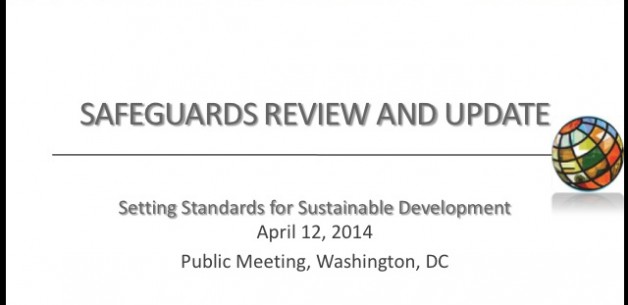This post is also available in: Spanish
On April 12, 2014, the World Bank held a session for civil society during Spring Meetings in Washington, DC entitled “Safeguards Review and Update: Setting Standards for Sustainable Development.” A full eighteen months after the World Bank initiated the review of its social and environmental safeguard policies, the review process is once again moving ahead at full speed. A first draft of the revised safeguard framework is well underway and planned for submission to the Executive Board’s Committee on Development Effectiveness (CODE) on June 26, followed by pre-consultations in July and August and a subsequent comment period September-November. The update session outlined the proposed framework for the Bank’s revised social and environmental safeguard policies, general information on borrower requirements for each standard, and the next steps in the Bank’s ongoing safeguard review.
The proposed framework consists of an overarching aspirational statement, a mandatory Environmental and Social Policy describing the Bank’s policy objectives and commitments, ten mandatory Social and Environmental Standards (ESS) that convey borrower requirements, mandatory supporting annexes, and non-mandatory guidelines. The Bank’s presentation also outlined the changes that differentiate the proposed framework from the existing safeguard policies and the perceived benefits of the new framework–which they described as improved clarity and accountability for Bank and borrower responsibilities, and better alignment of policies within the World Bank Group and with other multilateral finance institutions.
The update presented both good news and bad news. Although it is not possible to determine whether the content of the proposed policies will provide robust protections until the specific policy language is made public, the initial framework signals a few potentially positive developments. Among these positive aspects are indications that the Bank has finally embraced free prior informed consent (FPIC) for indigenous peoples; plans to include new ESSs on stakeholder engagement, financial intermediaries, and labor and working conditions; commitments to new standards on climate change; plans to undertake assessment of potential impacts to children, persons with disabilities, and other vulnerable groups such as LGBTI. However, civil society organizations have identified numerous areas of concern, including an emphasis on greater “flexibility” by allowing for open-ended compliance, or “reasonable timeframe for compliance.” The update session also demonstrated the Bank’s continued rejection of calls from civil society and many governments to widen the scope of the safeguard review to include development policy loans (DPLs), and to adopt a rights-based approach.
World Bank Safeguards Meeting: April 12, 2014



